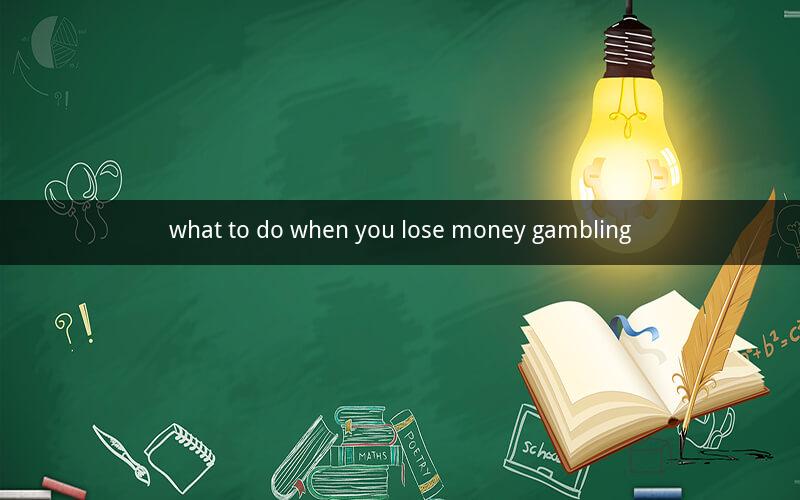
Table of Contents
1. Understanding the Emotions of Loss
2. Assessing the Extent of the Loss
3. Taking Immediate Steps
4. Reflecting on the Experience
5. Seeking Support
6. Learning from the Mistake
7. Developing a Responsible Gambling Strategy
8. Financial Management and Budgeting
9. Legal and Ethical Considerations
10. Preventing Future Losses
---
1. Understanding the Emotions of Loss
Losing money while gambling can evoke a range of emotions, from disappointment and frustration to guilt and shame. It's important to acknowledge these feelings and understand that they are a natural response to a negative outcome. Recognizing and processing these emotions is the first step towards recovery and preventing future losses.
2. Assessing the Extent of the Loss
Evaluate the financial impact of the loss. Determine if the loss is manageable or if it has caused significant financial strain. This assessment will help in deciding the next steps to take and the level of support needed.
3. Taking Immediate Steps
- Stop Gambling: Immediately cease any further gambling activities to prevent further losses.
- Secure Financial Records: Gather all financial records related to the gambling loss for future reference.
- Seek Professional Help: If the loss is substantial, consider seeking the assistance of a financial advisor or counselor.
4. Reflecting on the Experience
Take time to reflect on why you gambled and what led to the loss. Understanding the triggers and patterns can help in developing strategies to avoid similar situations in the future.
5. Seeking Support
Reach out to friends, family, or support groups for emotional support. Sharing your experience can provide comfort and guidance from those who have faced similar challenges.
6. Learning from the Mistake
Identify the lessons learned from the experience. This could include recognizing risky behaviors, understanding the odds of winning, or realizing the importance of setting limits.
7. Developing a Responsible Gambling Strategy
Create a responsible gambling plan that includes:
- Setting Limits: Establish a budget for gambling activities and stick to it.
- Time Management: Limit the amount of time spent gambling to prevent excessive play.
- Awareness of Odds: Understand the odds of winning and the risks involved.
8. Financial Management and Budgeting
Develop a sound financial management plan to address any financial strain caused by the loss. This may involve creating a budget, prioritizing bills, and seeking financial assistance if necessary.
9. Legal and Ethical Considerations
If the gambling involved illegal activities, it's important to understand the legal implications and seek legal advice if needed. Additionally, consider the ethical aspects of your gambling behavior and how it may have affected others.
10. Preventing Future Losses
To prevent future losses:
- Educate Yourself: Learn about gambling, its risks, and responsible gambling practices.
- Stay Informed: Keep up-to-date with news and resources related to gambling addiction and responsible gambling.
- Use Tools: Utilize tools provided by gambling platforms, such as self-exclusion lists and deposit limits.
---
Questions and Answers
1. Q: How can I overcome the guilt associated with losing money gambling?
A: Acknowledge your feelings and seek support from friends, family, or support groups. Understanding that gambling is a form of entertainment with risks can help in reducing guilt.
2. Q: What should I do if I find myself unable to stop gambling?
A: Seek professional help from a therapist or counselor specializing in gambling addiction. They can provide strategies and support to overcome the addiction.
3. Q: How can I set a budget for gambling activities?
A: Determine an amount of money you can afford to lose without causing financial strain. Stick to this budget and avoid chasing losses.
4. Q: What are some signs of a gambling addiction?
A: Signs include lying about gambling activities, borrowing money to gamble, feeling restless or irritable when not gambling, and prioritizing gambling over other responsibilities.
5. Q: Can I recover from a gambling addiction on my own?
A: While some individuals may recover on their own, seeking professional help can provide more structured support and strategies for recovery.
6. Q: How can I avoid falling into the trap of risky gambling?
A: Educate yourself about the risks of gambling, set clear limits, and avoid gambling when under the influence of alcohol or drugs.
7. Q: What resources are available for those struggling with gambling addiction?
A: Resources include support groups, counseling services, and websites dedicated to gambling addiction and responsible gambling.
8. Q: How can I help a loved one who is struggling with gambling addiction?
A: Offer support, encourage them to seek professional help, and be patient. Educate yourself about gambling addiction to better understand the situation.
9. Q: Can I win back the money I lost gambling?
A: While it's possible to win back some money, it's important to remember that gambling is a form of entertainment with a high risk of loss. Chasing losses can lead to further financial strain.
10. Q: How can I ensure that my gambling habits remain responsible?
A: Regularly review your gambling activities, set limits, and seek support when needed. Stay informed about responsible gambling practices and be aware of the risks involved.